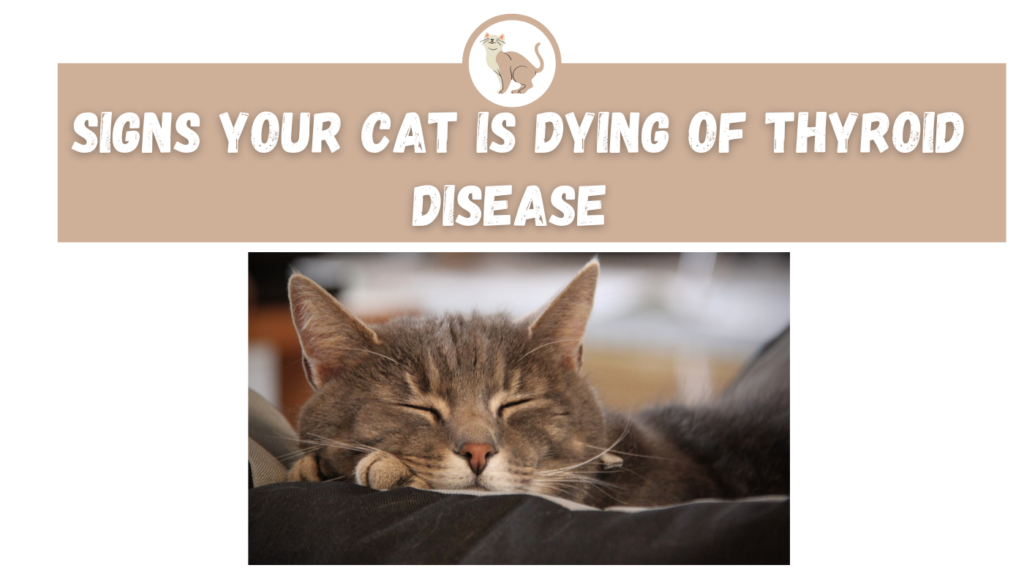Thyroid disease is one of the most common endocrine conditions that affects many middle-aged and senior cats. The problem typically occurs in cats after the age of 10.
It is the most common hormone imbalance in older cats and is caused by a disorder of the thyroid gland. Cats have two thyroid glands that sit on either side of the windpipe in the mid-neck area.
The thyroid hormone in cats controls the function of most organs in their bodies. A malfunctioning thyroid gland can cause dangerous health problems.
Thyroid disease in cats is a very treatable disorder and most hyperthyroid cats make a complete recovery and live a healthy life.
Do you know the signs of thyroid disease to watch for in your cat? Let’s have a look at the common clinical symptoms and some severe signs of Thyroid disease in cats.
Common clinical signs of Thyroid disease
The signs of thyroid disease are consistently vague, dramatic, and varied. During the early stages, the cat seems healthy and full of energy. The most common signs of feline thyroid disease in felines include:
- Rapid weight loss
- Increased appetite
- Increased energy
- Hyperactivity particularly nervousness or restlessness
- Poor coat condition
- Rapid heart rate
- Increased thirst and urination
- Vomiting
- Sickness and diarrhea
- Restlessness associated with the increased central nervous stimulation
- Behavioral changes, anxiety, and night bowling
Some cats with hyperthyroidism develop an obsessive behavior associated with increased licking and grooming. This may result in alopecia, skin rash, and skin bald patches. For cats with advanced hyperthyroidism, their nails may appear thickened and more fragile than normal.
How to help keep a cat’s thyroid healthy?
The two best ways to keep a cat’s thyroid healthy is to give it the right diet and provide cat thyroid supplements.
Is thyroid disease in cats fatal?
Feline thyroid disease is treatable and can be easily managed if diagnosed early. Leaving your cat’s thyroid disease untreated, however, can result in many difficulties.
When the thyroid hormone level in felines becomes excessive, some life-threatening problems may occur. It can lead to organ failure and can even be fatal. But it takes a while before the cat becomes very sick. With time, severe muscle wasting and death from starvation may occur.
Abnormal thyroid levels cause an increase in the cat’s blood pressure. It is important to decrease high blood pressure in affected cats to subside the accompanying issues.
Signs Your Cat Is Dying Of Thyroid Disease
A thyroid problem is a slowly progressive disease. Many felines have mild symptoms for months or even up to a year before the problem is diagnosed. Undiagnosed and untreated cats will eventually become very sick and develop raised blood pressure, congestive heart failure, and kidney failure.
Untreated thyroid disease can lead to many complications. Below are some of the common signs that your cat is dying of thyroid disease:
- Heart disease resulting in heavy breathing
- Some cats with severe thyroid problems may eventually become extremely weak or even collapse from exhaustion and shortness of breath.
- Kidney disease
- Extreme weight loss
- Extreme thirst
- Seizures
- Sudden-onset blindness because of high blood pressure
If your cat has one or more of these clinical signs and is older than 10 years of age, you should definitely have your cat tested for thyroid disease. It is treated with medication and diet. The goal of treatment is to control the thyroid disease and allow the cat to feel better.
It is important that you don’t stop giving your cat thyroid medicine supplied by the vet.
How long can a cat live with thyroid problems?
A cat suffering from thyroid disease can live a normal, healthy life well into its senior years! In most cases, thyroid disease in cats can be treated and managed successfully.
Most cats that are diagnosed and are treated only with medical management will live an average of 3 to 5 years. If your cat is suffering from this problem, you should stay in close communication with your veterinarian. It is wise to do a complete bloodwork test in affected cats to look for secondary disorders.
Final Thoughts
Thyroid disease can be easily managed and treated with early detection and preventive care. Most cats with thyroid disease can make a complete recovery.
You can’t make your cat live forever, but you can help your feline pal live the healthiest life possible. Just take good care of your kitty and visit your vet regularly.
Having a kitty is obviously like having another family member. The responsibility of taking care of your feline member makes your life more meaningful!
If you have any questions about Thyroid disease in cats, please do let us know. Until next time everyone!



